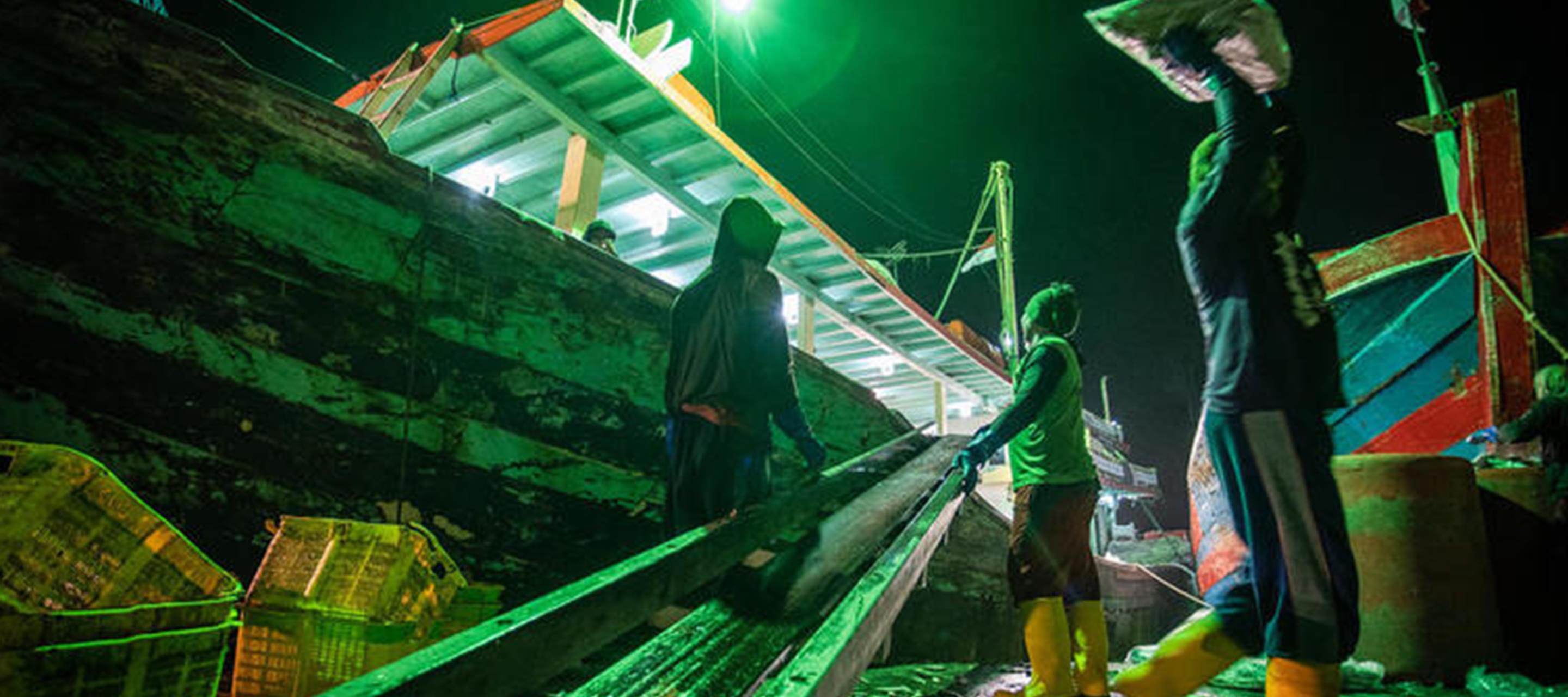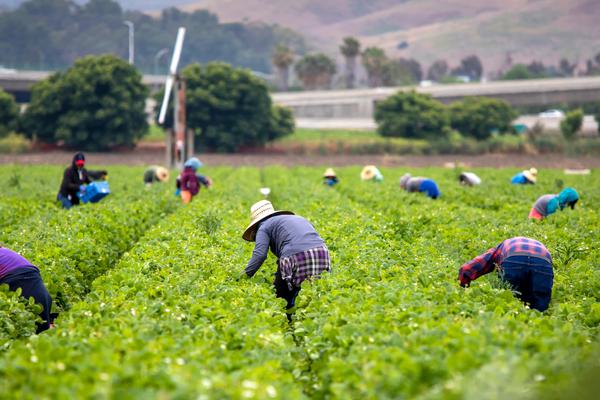Distant water fishing fleets - preventing forced labour and trafficking
11 June 2020

Distant water fishing is a lesser-known, lesser-scrutinised area by brands, investors, and consumers, and yet it engenders human rights risks across major global supply chains.
International brands, and the investors who finance them, have a responsibility and significant role to play in helping to prevent exploitation of workers and environmental degradation in international supply chains. In fact, they may suffer reputational, financial, legal, and operational risk should they fail to do so. Increased scrutiny by governments - including transparency clauses in modern slavery legislation covering brands and investors - further makes action to prevent forced labour an imperative.
On 1st June 2020, IHRB’s Leadership Group for Responsible Recruitment and the Investor Alliance for Human Rights, co-hosted a virtual discussion, featuring findings from investigations by Greenpeace Southeast Asia and Greenpeace East Asia, that examined how investors, international brands, suppliers, and civil society groups can work together to prevent exploitation and ensure best practice.
Unfortunately a technical error on the webinar platform Livestorm caused the event recording to be unuseable, but a transcript of the discussion was salvageable and made available to capture the details of the rich discussion.
The conversation featured:
- Andy Shen, Senior Oceans Advisor, Greenpeace USA
- Lisa Tsal, Project Lead, Greenpeace East Asia
- Matthew Owens, Director of Sustainability, Tri Marine
- Darian McBaln, Executive Advisor, Thai Union
- David Schilling, Senior Program Director, Interfaith Center on Corporate Responsibility
- Neill Wilkins, Head of Migrant Workers Programme, IHRB
Questions submitted by participants
IHRB received a number of excellent and wide-ranging questions for speakers in advance of the broadcast, as well as many more during the live discussion. We have shared those below to give a sense of the concerns that business, government, and civil society practitioners are grappling with.
At registration:
- Please share how businesses can influence distant partners/ governments in escalating fishers’ labou
- Did you agree slavery if pay by e-trans and keep the record from owner to crew is helpful to change?
- In an ideal world, how often should dwfv return to port?
- How to implement of C-188 annex-2 for Fishers Work Aggrement, Specially to ensure legitimate of FWA
- What if the investors are indifferent or blindfolded to the forced labour / trafficking?
- How do we get companies to perform proper human rights due diligence given issues e.g. transshipment
- How can we reduce if not eliminate forced labor on distant water fishing fleets?
- Which national institutions have a mandate to investigate and document the human rights issues?
- How can we prepare people on these boats before they accept the jobs?
- What is the most important action, in your opinion, that retailers and suppliers can do to address?
- Would transshipments at port avoid a significant amount of incidents?
- How much oversight do brands have over distant fishing?
- How was the data collected and vetted?
- Many of the offshore tuna longline vessels have benefitted through harmful fisheries subsidies...
- What logistical barriers prevent companies from confirming they do not source from IUU boats?
- What steps may be taken to counter forced labor on fishing vessels PRIOR to a worker boarding?
- What role do you see human observers and remote electronic monitoring systems playing in the effort?
- What would you say are key unlocks for monitoring human and labor rights on distant water vessels?
- How engaged is the IMO in addressing non compliant shippers registered?
During the live broadcast:
- Really insightful and inspiring discussion. Thanks a lot for everyone! To Darian, the work Thai Union has done is just amazing.
- If lists of suppliers and ships are publicly available problematic actors can be flagged so that the buyers can respond quickly. It is also deterrent as the ramifications would be more likely. So is there a reason for TU or Tri marine not to publish such lists (if they do not )?
- IOM's IRIS system provides a certification for recruiters: https://iris.iom.int/
- true... except you also have to calculate in the cost of recruitment, health & safety equipment, decent living quarters, VMS and traceability on every vessel.... all these things that provide better conditions but also *cost money*!
- To Ame - That is why I think we should understand precisely how big is the contribution of labour cost to the total production cost plus the top limit of customers' willingness to pay. If the labour cost is insignificant, law enforcement is the strongest solution to be imposed against the greed.
- How is the role of RFMO/a in reducing forced labor in DWF.
- Is the market state more effective and how to strengthen monitoring activities
- Question for Darian - I was impressed to see operating costs, corporate responsibility costs, and labour costs included in the TU 2019 CSR report. Do you think this will help open the door to wider conversations with buyers around the price of sustainably sourced seafood products?
- To Lisa: Who have the management rights to FOC vessel ? Her flage or others country ? If her flage can't control, how to ask anothers ? any Convention regulate ?
- To Aditya's Q - regarding the business model as a whole: if buyers rightly continue to ask for better practices which impose increase costs, but then refuse to pay the real cost of production, aren't retailers/buyers *creating* a problem that forces a reliance on FL/env abuses ...?
- To what extent can we rely on MSC? Some companies just think it’s enough to show their commitment on human rights by buying/selling products with MSC.
- How much more would it cost per can of tuna to pay workers on vessels and in factories a living wage?
- For Darian and Matt: If the STF is an industry-led body, what power do CSOs and other stakeholders have in making decisions or imposing direction within that body?
- A question for the whole panel: Greenpeace's Choppy Waters report recently highlighted serious allegations of labour abuse on vessels from which FCF sources seafood. How should groups like the Seafood Task Force be reacting to such information?
- I really hope that the panelists could give an economic perspective over the triangular relationship between price, cost and customers' demand of the fish. Is there any possibility that the phenomenon of forced labour is caused by the reluctance of the customer to purchase fish with a higher price?
- I wonder how business including the brands and retailers like Thai Union and Tri Marine can help and work with us to stop the rampant slavery and human trafficking on the fishing fleets from Taiwan (whether or not with Taiwan flag)?
- Matt: Does Tri marine publish a publicly available list of the suppliers and ships it works with, aside from the ones that it fully owns?
- A question for TU- does the Sea Change strategy apply to all operations/supply chains, globally, e.g. shrimp in Indonesia or Vietnam?
- Does Thai Union publish a publicly available list of the suppliers and ships it works with?
- Andy: CBP can detain goods "believed" to be made with forced labor. Companies can provide evidence that goods were not made with forced labor. In the case where it can proven that goods were not made with forced labor, wouldn't your recommendations render an importer guilty until proven innocent?
- Andy, do you think the current business models can ever solve these IUU and exploitation problems? Do you have alternative business models to propose for overall industry improvements?
- Does Greenpeace envisage it being possible to establish on DWF vessels some effective and safe worker voice mechanisms which have capacity to respond quickly to urgent issues? If so, how?
- Andy: will the enhanced US-China trade war give those nations supporting the US a way to avoid scrutiny?
- What is the value of naming importers, value of goods, end buyers before a full investigation is concluded?
- What would be your key recommendation, if any, to the Australian Foreign Aid program in the Pacific for improving the situation of modern slavery in the Pacific fishing industry?
- Many international organizations jump into concern the issue, but how to enforcement each country practice in her territory water and onboard fishing vessel ? and if you do not allow each country join to the management party(RFMOs or UN system) ?
- If you have tech-based or human surveillance and monitoring, how do we deal with the human rights implications? Who owns the data? Who controls it? Who has access to it? How long is it retained?
- What are good examples of remedy in this space (for survivors of labor exploitation)?
- How do companies assess with port States are effectively implementing ILO C188 inspections (to show preference to them)?
- Is Greenpeace also asking for ratification of ILO Work in Fishing Convention 188 by flag states?
- How do NGOs like Greenpeace assess the trade offs between advocating for human monitoring and the risks posed to observers (and the subsequent challenges with prosecution for offenses)?
- Here is Greenpeace's 2020 corporate ask for seafood supply chain that Andy talks about: https://www.greenpeace.org/usa/wp-content/uploads/2020/03/Final_GP-seafood-market-ask_Feb-2020.pdf
- Could Greenpeace share with us their advocacy work with Taiwan? What has Greenpeace achieved in dialoguing for policy change and what are the challenges?
- I wonder the organisation helping the workers in Pemalang shown in the end of the video.. Can i get their contact? Thank you
- Can you describe the intersection you are seeing in your work between IUU fishing and forced labor?
- Does Greenpeace or other NGOs have information on the beneficial ownership of the vessels that are featured in your reports?
- Are communication lines/ options restricted and/or monitored for migrant workers at sea by employers?
- What are the flags of convenience most commonly used by Taiwanese ships? And these ports of embarkation in third countries - where are they?
- operator DFW can rent foreign flag vessels an operating in other eez of the country
- DWF has many definitions, How to simplify to conduct the legal basis for fisher work agreement. Base on flag state pr owner/operator domicile. Thanks



